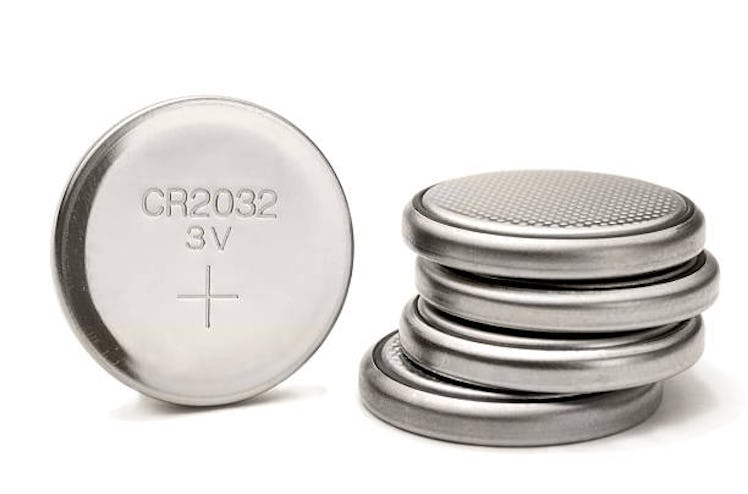What Is Reese's Law? Landmark Legislation Protects Kids From Battery Ingestion
Parents still need to be vigilant about keeping button batteries away from kids.

What are button batteries? Parents might not know that button-cell batteries — typically used to power watches, keyless car entry remotes, and other products that require a slim, compact power source — have been one of the more under-the-radar household health hazards for years, potentially leading to major injury or death in kids. But thanks to a law signed by President Biden and passed by both houses of Congress last fall, they should soon become much more difficult for kids to get their hands on accidentally.
Kids can be drawn to button batteries because they’re shiny, smooth, and easy to grab. And since small children instinctively put almost anything they seize into their mouth, they’re a massive choking risk. But the danger doesn’t stop there: Even if swallowed cleanly, the acid within the button batteries can seep out when the batteries become wet, causing significant damage to the esophagus and internal organs in very little time.
That’s what tragically happened to 18-month-old Reese Hamsmith back in October 2020. A button battery she swallowed caused irreparable internal damage after it burned a hole through her throat and stomach. Unfortunately, two months of intensive medical care — including several surgeries — weren’t enough to save her life.
Shortly following Reese’s death, her mother, Trista Hamsmith, established Reese’s Purpose to raise awareness of the danger of button batteries and champion more robust safety measures for the products they power. Her efforts paid off in August when Resee’s Law passed congress with bipartisan support.
“Reese’s Law will help prevent thousands of serious injuries by strengthening small battery safety standards,” said Senators Richard Blumenthal and Marcia Blackburn in a press statement. “We are relieved this common-sense legislation has passed Congress and is on its way to President Biden’s desk to become law so families can have greater peace of mind about the safety of products in their home.”
According to the press release, Reese’s Law will direct the U.S. Consumer Product Safety Commission (CPSC) to create safety standards to prevent accidental ingestion of button batteries by children, including by:
- Creating performance standards requiring the compartments of consumer products containing button cell or coin batteries to be secured to prevent access by children 6 years of age or younger.
- Requiring button or coin cell packaging to be secured in a child-resistant manner.
- Requiring warning labels in product manuals, on the packaging, and directly on the product when practical.
- Requiring warning labels that clearly identify the hazard of ingestion.
- Requiring warning labels that instruct consumers to keep new and used batteries out of the reach of children and to seek immediate medical attention if a battery is ingested.
Although Reese’s Law should make it more difficult for kids to get their hands on button batteries, it does nothing to make the batteries any safer. Even after the law is implemented, there will still be a significant onus on parents to store and dispose of button batteries safely.
Avoiding devices that require button batteries removes the danger altogether by keeping them out of your home. But when that’s not an option, keep the cells in their original packaging and out of reach of children until use.
To safely dispose of button batteries, wrap each one in electrical tape and keep them in a secure location until you can deliver them to a local household hazardous waste collection facility or a retailer that provides battery takeback services, as recommended by the EPA.
This article was originally published on